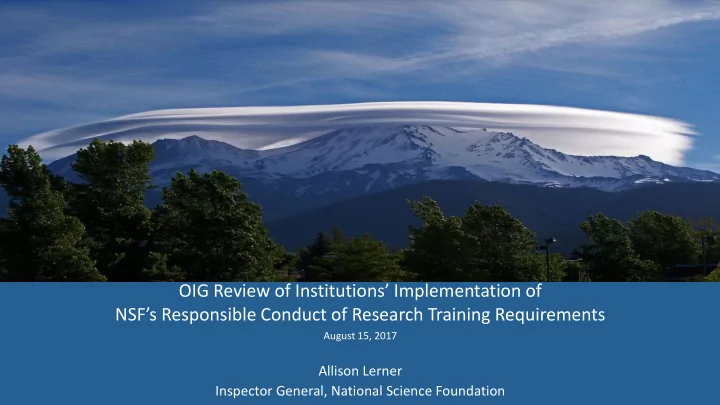

OIG Review of Institutions’ Implementation of NSF’s Responsible Conduct of Research Training Requirements August 15, 2017 Allison Lerner Inspector General, National Science Foundation
Review of NSF’s RCR Training Policy • America COMPETES 2007 • NSF’s Director shall require each institution to provide appropriate training in RCR to UGP researchers participating in the proposed research project • NSF’s Guidance to Institutions: • Have a plan to provide appropriate RCR training to UGP researchers who will be supported by NSF to conduct research • Designate someone to oversee compliance • Verify that UGP researchers supported by NSF to conduct research have received RCR training — tracking • No guidance/templates , NSF recommends risk assessment • Institutional certification is required for each proposal
Institutions That Had RCR Plans When First Contacted by OIG 53 initial institutions; ultimately 48 institutions, 11 w/o plans
Characterization of RCR Training Required trainee population is Required training population is not limited to NSF-supported limited to NSF-supported participants participants Trainee population is able to fulfill the RCR requirement by 64% – Compliance 9% – Hybrid only taking online training or through document review Compliance Trainee population receives RCR content through required 9% – Hybrid 19% – Educational interactive training ( i.e ., a course, workshop, or seminar) Educational • 73% required only those supported by NSF grant to be trained • 73% allow online only training to constitute appropriate training. -
Some Best Practices We Saw • Adding stress management to RCR training • Requiring RCR training for all graduate students (even if they are not funded by NSF) • Involving faculty in RCR training (only 15% currently do) • Requiring periodic RCR refresher training — every 3+ years • Requiring participants to take training before beginning NSF research
Observations from RCR Review • Most institutions have RCR plan, designated person, and tracking • Without definitions, guidance, or standards as to what constitutes “appropriate training,” NSF cannot ensure that the instruction provided meets a minimum level of quality • Institutions often suggested they want guidance, not regulations • Plans reviewed were more focused on ‘compliance’ approach than ‘education’ approach • Prevalence of online training • A low percentage of PIs are involved in RCR training
Thoughts on RCR and Mentoring • Better RCR training could go a long way to preventing some of the problems RM issues our office see • Is computer based training the best? • Students surveyed suggest that interactive training is preferred • If offered an option, they usually select computer based • Some research suggests that interactive/hybrid training may be more successful • In RM cases, we have been recommending interactive training for several years • RCR is not just for students • 96% of our plagiarism findings from FYs 2012-2016 involved faculty/PIs • We also know that a significant number of our RM cases involve researchers who received part or all of their academic training outside the U.S. and may not be well versed in U.S. research standards and ethics • Where have all the mentors gone? • Numerous student data fabrication cases appear to involve a lack of adequate oversight and mentorship by the PI • Do PIs regularly discuss research ethics with their students? • Do PIs regularly review data collected by their students? (Lack of data can be an issue in student F/F cases) • Mentorship training for faculty? • Mentors assigned to new faculty?
Recommend
More recommend